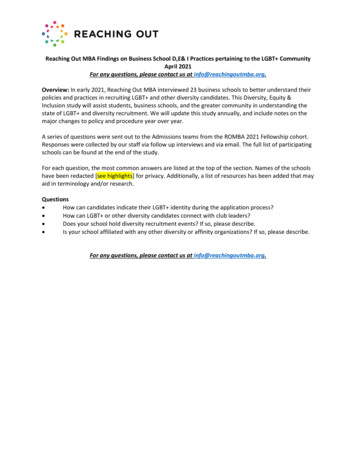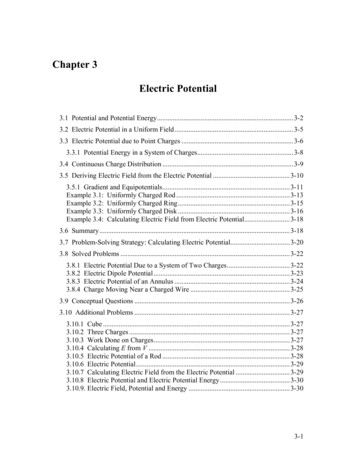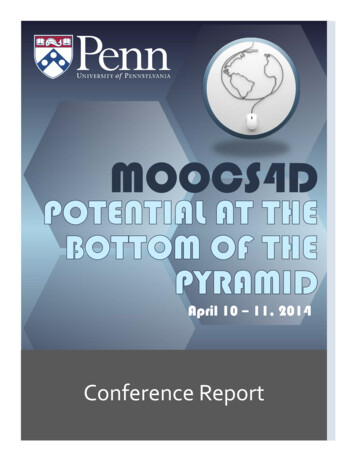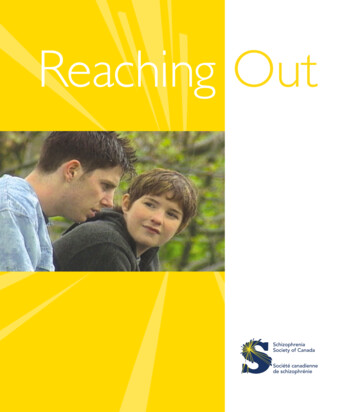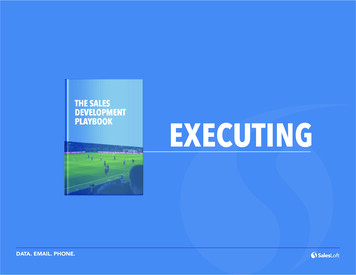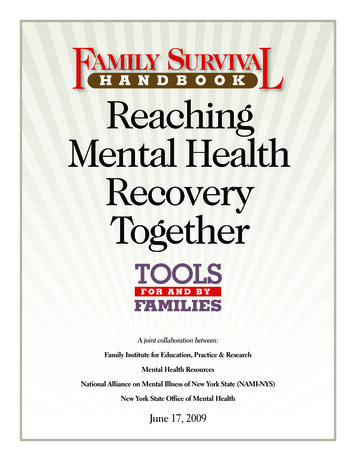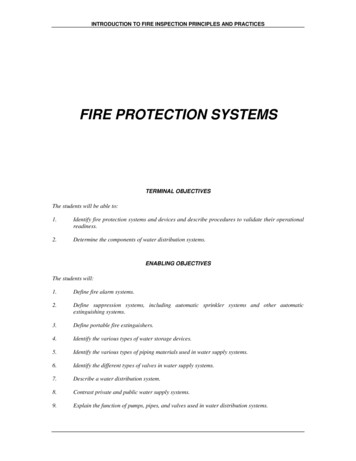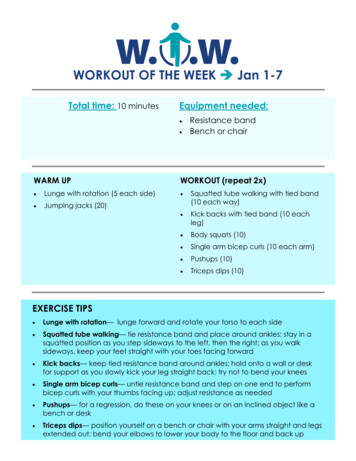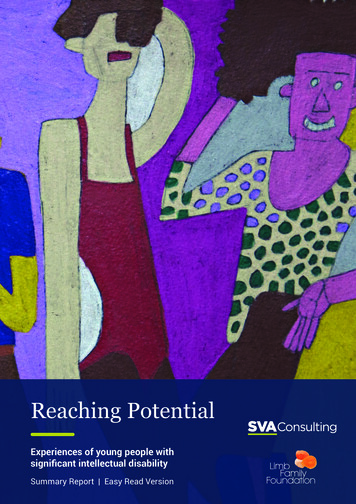
Transcription
Reaching PotentialExperiences of young people withsignificant intellectual disabilitySummary Report Easy Read VersionReaching Potential - Summary Report - Easy-Read VersionA
How to use this reportSocial Ventures Australia wrote this report.When you see the words ‘we’ or ‘our’,it means Social Ventures Australia.When you see the words ‘intellectual disability’ itmeans someone who might have difficulty with learning,talking, understanding and living by themselves.When you see the words ‘services’ or ‘supports’,this means the people or organisations that aredoing something to help you, such as making sureyou have what you need to go to school or live whereyou want to live.This report is written in an easy-to-read way.You may see some hard words.We will explain what they mean.You can find the original version of this report here.Reaching Potential - Summary Report - Easy-Read Version
Anthony Romagnano, Not titled, 2020What’s in this report?Why did we write this report?2What did we do?5A story to share126 things that can help14Coronavirus20Contact us21Reaching Potential - Summary Report - Easy-Read Version1
Why did wewrite this report?All young people should be able to do whateverthey want in life.We know this can be hard for young people withintellectual disability.They face additional difficulties like not being able toaccess the right supports, services and opportunities likeother young people can.This can make it harder for young people with intellectualdisability to do things like see a doctor, go to school,meet with friends and get a job.Reaching Potential - Summary Report - Easy-Read Version2
3%3 Percent of people living in Australiahave an intellectual disability.300,000 Young People living in Australiahave an intellectual disabilityCompared to peopleliving in Australia withoutintellectual disability, peoplewith intellectual disability:Are 2 and a half times more likelyto have problems with their healthAre more than 2 times more likelyto die from something that could havebeen stopped from happeningAre 2 and a half times less likelyto finish year 12 of schoolAre 2 times less likelyto have a jobAre much more likely to experiencebeing left out of a communityReaching Potential - Summary Report - Easy-Read Version3
The community needs to know the needs of youngpeople with intellectual disability and include them inconversations about how to make things better.The National Disability Insurance Scheme has helpedpeople with intellectual disability but more can be done.Coronavirus is a virus that has affected many peoplearound the world. Coronavirus has made it even moredifficult for young people to have access to everythingthey need.We will talk more about Coronavirus later in this report.We wrote this report so people can understand moreabout young people with intellectual disability and knowhow they can make life better for them.We know there is still more work to be done.Reaching Potential - Summary Report - Easy-Read Version4
What did we do?We talked to 11 different people withintellectual disability and their carers.A carer is someone who helps to look after a person.We asked the people with intellectual disability or their carersto tell us their stories so we could learn about their lives.Here are the people we talked to:Mark and hismum, AnnaMark is 7 years old.Mark goes to a special school.He loves planes.He is a very happy person. Not much scares him.Mark has difficulties with talking and he has autism.Autism is when someone has difficulty with talking,understanding feelings, or making friends. People withautism may like specific things and prefer to do the samethings every day. Everyone with autism is different. Somepeople with autism can do many things on their own whilesome may need help.Mark and Anna want Mark to make friendsand play with friends at school.Reaching Potential - Summary Report - Easy-Read Version5
Shaun and hismum, MaddyShaun is 10 years old.Shaun loves to swim, play sport and make pancakes.Shaun is very friendly.Shaun has a lot of difficulty with talkingand he is learning sign language.Sign language is how many people who are deaf talk.Sign language uses hand and finger shapes to formwords and sentences. There are many sign languages inthe world. Sign language in Australia is called Auslan.Shaun and Maddy are getting help fromtherapists to improve Shaun’s talking.Leo and hismum, SophiaLeo is 19 years old.Leo is always on the move. Leo has fun most of the time.Leo finds it hard to learn, talk and understand.Leo also has autism.Leo and Sophia are trying to find somewhere for Leo togo during the day where he can be with his friends.Sophia wants Leo to feel safe at this place.Reaching Potential - Summary Report - Easy-Read Version6
Joe and hismum, SandraJoe is 21 years old.Joe is very friendly and caring.Joe finds it very hard to learn. Joe has adifference with one of his chromosomes.Each person has 46 chromosomes inside them whichcarry unique information that is passed on from parentsto children. Having too many, not enough or differentlooking chromosomes can cause disability.Joe and Sandra are looking for a job for JoeMitch and hissister, FranMitch is 24 years old.Mitch loves his family.When Mitch isn’t busy, he likes to play on his ipad.Mitch finds it hard to learn, talk and understandand he also needs some help with movement.Mitch and Fran are working on improving Mitch’slife skills so that he can live by himself.Reaching Potential - Summary Report - Easy-Read Version7
Katherine andher mum, LisaKatherine is 24 years old.Katherine likes to ask lots of questionsand to make people laugh.Katherine likes swimming, art and being outside.Katherine sometimes finds it hard to learn, talk and understand.Katherine has autism and anxiety.Anxiety is when you feel worried or sad when somethinghappens, or you think something bad will happen. Anxietycan cause a sore head and an upset tummy.The anxiety can go away and get better but forsome people it can stay for a long time.Katherine and Lisa are testing different medicines thatcan help Katherine’s anxiety.Reaching Potential - Summary Report - Easy-Read Version8
Nathan andhis mum,JodieNathan is 25 years old.Nathan likes to spend time with his friends and he loves to talk.Nathan has Cerebral Palsy and he uses a wheelchair.Cerebral Palsy is a type of disability where some people havedifficulty moving and sitting or standing by themselves. It cansometimes be hard to walk and talk. Each person with CerebralPalsy is different. It usually starts when a person is born.Nathan and Jodie are building a house forNathan and his two friends to live in.We will tell you more about Nathan later on.Dave and hismum, SandraDave is 28 years old.Dave can understand two languages, English and Lebanese.Dave finds it hard to talk and he needs help to make decisions.Dave and Sandra are trying to make his day program safer.Reaching Potential - Summary Report - Easy-Read Version9
Pete and hissister, StephPete is 28 years old.Pete trusts many people.Pete likes to have fun and play tricks on his family.Pete finds it hard to learn, talk and understand andhe also needs some help with movement.Pete and Steph are working on helpingPete to do things by himself.Emma andher dad, BradEmma is 28 years old.Emma is very happy and cheerful.Emma has lived by herself for 6 years.Emma finds it very hard to learn, talk and understand.Emma has autism.Emma likes things to happen the same way each day.Emma and Brad are working on helpingEmma to make decisions by herself.Reaching Potential - Summary Report - Easy-Read Version10
Connorand hiscarer, DavidConnor is 36 years old.Lots of people know about Connor because he isvery good at taking photos and making art.Connor had a seizure when he was born.A seizure is when messages in the brain move too fast or ina different way. This can make people have a fit which cancause someone to shake and not have control of their body.Connor sometimes finds it hard to learn, talk and understand.Connor wants an ongoing job so hecan move into his own home.After we spoke to all the people with intellectualdisability we came up with six main things thatimpact on the lives of young people.We looked for information from research, otherreports and programs to find out what thingscan help young people to have better lives.We also talked to people that work in the community,people who conduct great research and people that supportyoung people with intellectual disability around Australia.Reaching Potential - Summary Report - Easy-Read Version11
A story to shareWe will tell you a bit more about Nathan now.Nathan lives with his mum, Jodie in Melbourne.Nathan doesn’t have any brothers or sisters.Nathan is 25 years old.Nathan likes to spend time with his friends and he loves to talk.Nathan has Cerebral Palsy and he uses a wheelchair.Nathan can remember names, find placeshe visits often and talk with others.At schoolWhen Nathan was little, he went to two schools –a school for children with disability and a schoolfor children with and without disability.Nathan liked school when his supportteacher understood what he needed.Nathan was able to make friends at theschool for children without disability.It was harder for Nathan to make friends at theschool for children with disability because he wasput in a different classroom to that of his friends.Jodie tried to get Nathan in the same class as his friend butthis did not happen. Jodie thought the school for children withdisability could have helped Nathan more to make friends.Reaching Potential - Summary Report - Easy-Read Version12
After schoolNathan is now an adult.When Nathan is bored, his carers oftenthink he is being naughty.But Nathan is not being naughty, hewants to talk with his carers.Jodie worries that Nathan’s carers do notunderstand him well enough.Jodie knows that Nathan is respectful to other people.Respectful means when you are polite and kind to people.What does Nathan want?Nathan wants to live in his own home with his friends.Nathan is used to living away from Jodieas he often stays in respite homes.A respite home is where people with many care needs maygo to stay so that their carer or family can have a rest.Nathan has lots of friends that Jodie has helped him to make.Nathan has a good support network thatcan help him to look after himself.Reaching Potential - Summary Report - Easy-Read Version13
6 things that can helpWe listened to everything that everyone told us.We found there are 6 things that people can work on to makelife better for young people with intellectual disability.1. Help young people with intellectual disabilityto do the things that they want to doWhat we learnt Young people with intellectual disability should behelped to be able to do what they want to do in their life. This was a common hope for carers and families andshould be what support services focus on doing. Young people with intellectual disability are not alwaysasked about what they want to make their life better. Some people don’t know how to talk with people withintellectual disability. This means young people withintellectual disability can get left out of conversations. Young people with intellectual disability need help tounderstand all the service options that they can use todo what they want to do.What can help? Young people with intellectual disability must beincluded when making decisions about their life. They must get the supports and information that theyneed to participate and know what is possible.Reaching Potential - Summary Report - Easy-Read Version14
2. Create opportunities for young people withintellectual disability to go to school, get ajob and be a part of the community.What we learnt Young people with intellectual disability should havegood services and support from a very early age. This can help young people with intellectual disability tolive the life that they want to live Young people with intellectual disability are not alwaysfully included at school, at work and in their community. Services and supports that are ready to work withyoung people with intellectual disability are hard to find. It can be very hard for people with intellectual disabilityto do what they want after finishing school.What can help? People who work at schools, learning places,workplaces, employment services and in disabilityservices must work together to support young peoplewith intellectual disability. Young people with intellectual disability must beprovided with an environment that makes them feelsupported and included. Young people with intellectual disability need plans thatlast a long time to help them as they grow older. There must be money and trained people ready tosupport young people with intellectual disability to learn,find a job and participate in the community.Reaching Potential - Summary Report - Easy-Read Version15
3. Create safe homes for young people withintellectual disabilityWhat we learnt Many young people with intellectual disability want tolive in their own homes. Carers also want young people with intellectualdisability to be able to live in their own homes. Safe and suitable homes for people with intellectualdisability are difficult to find. Good support is not alwaysavailable to let young people with intellectual disabilitylive where they want to live and with who they want tolive with. Different supports are needed to help young people withintellectual disability as their carers get older.What can help? Everyone needs to work together so that young peoplewith intellectual disability can find homes and supportsso that they can live where they want to live and withwho they want to live with. Young people with intellectual disability and their carersshould get help in planning their supports for the future.Reaching Potential - Summary Report - Easy-Read Version16
4. Help young people with intellectual disabilityto choose and access the right servicesWhat we learnt It is important that young people with intellectualdisability can access the very best services The National Disability Insurance Scheme is givingyoung people with intellectual disability more servicesto choose from, but it is still difficult for people that needlots of support. It can be hard for young people with complexintellectual disability to find the right supports. Support plans don’t always give young people withintellectual disability what they need Sometimes there is not enough money to pay forservices. There is not enough staff that understand how to workwith young people with intellectual disability. There is not enough support to help young people withintellectual disability make good choicesWhat can help? Everyone including people who work at the Governmentand people who work for the National DisabilityInsurance Agency need to work together. Everyone needs to work together so young people withintellectual disability can get better services and besupported to make good choices.Reaching Potential - Summary Report - Easy-Read Version17
5. Help young people with intellectualdisability to be healthyWhat we learnt Being healthy is an important part to having a better life. Young people with intellectual disability canhave many and complex health difficulties Health services need to be able to provide holistic careHolistic care means to treat medical problemsbut also look at social and other things that maycause problems for people with disability. People who work in health like doctors, nurses andtherapists often don’t know how to talk and carefor young people with intellectual disability. There are sometimes problems with how preparedthe health system is to support young people withintellectual disability that have more complex difficulties. There are more barriers when youngpeople with intellectual disability also havedifficulties with their mental wellbeing.Mental wellbeing is how someone reacts to goodand bad things in life. It includes how people think,manage their feelings and what they do each day. It can also be hard for people who work in healthand people who work in disability to work together.Reaching Potential - Summary Report - Easy-Read Version18
What can help? Everyone needs to work together so youngpeople with intellectual disability canhave access to good health care People who work in health and mental healthservices need to improve their understandingand ability to support the different health needsof young people with intellectual disability.6. Create an environment where young peoplewith intellectual disability are valued byeveryone.What we learnt If young people with intellectual disability are valuedin communities then their lives are improved People in the community can think badly about youngpeople with intellectual disability. This is disappointingand wrong. The community needs to understandmore about young people with intellectual disability. The community needs to think more positivelyabout young people with intellectual disability.What can help? Everyone needs to work together to showhow important people with intellectualdisability are in our community.Reaching Potential - Summary Report - Easy-Read Version19
CoronavirusCoronavirus is a virus that has affectedmany people around the world.A virus is an illness or disease that can easilyspread from one person to another person.Coronavirus spread very quickly around Australia.Many people were asked to stay at hometo stop the spread of coronavirus.Coronavirus made life harder for some youngpeople with intellectual disability.It showed how young people with intellectualdisability continue to be left out of the system.Here are some of the things that were made harder: It was harder to access support services More young people with intellectual disability werelikely to be hurt or not looked after properly It was harder for services to help youngpeople with intellectual disabilityWe still don’t know what is going to happen after. For example: There might be less jobs for youngpeople with intellectual disability Young people with intellectual disabilitymight find it difficult to access services thatare being provided on the internetReaching Potential - Summary Report - Easy-Read Version20
Contact usIf you would like to speak to us about this report you cancontact us by:Email:info@socialventures.com.auWebsite: socialventures.com.auReaching Potential - Summary Report - Easy-Read Version21
Cover image:Anthony Romagnano,Grace Jones, 2018Social Ventures AustraliaBrisbane Darwin Melbourne Perth Sydney ABN 94 100 487 572 AFSL 428 865info@socialventures.com.au socialventures.com.au @Social VenturesReaching Potential - Summary Report - Easy-Read Version22
Pete and his sister, Steph Emma and her dad, Brad Reaching Potential - Summary Report - Easy-Read Version 10 Pete is 28 years old. Pete trusts many people. Pete likes to have fun and play tricks on his family. Pete finds it hard to learn, talk and understand and he also needs some help with movement. Pete and Steph are working on helping
